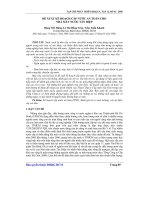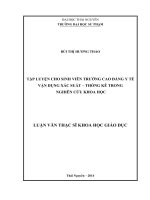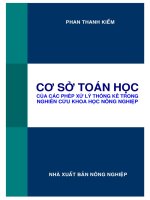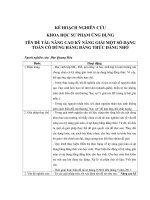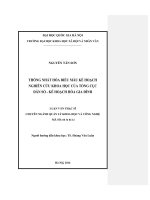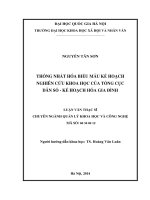research proposal Kế hoạch nghiên cứu khoa học
Bạn đang xem bản rút gọn của tài liệu. Xem và tải ngay bản đầy đủ của tài liệu tại đây (108.89 KB, 8 trang )
HANOI OPEN UNIVERSITY
FACULTY OF ENGLISH
ASSIGNMENT ON SCIENTIFIC STUDY
METHODOLOGY
A STUDY ON : THE USAGE OF SLANG IN
ENGLISH AND VIETNAMESE
( Cách sử dụng của tiếng lóng trong Tiếng Anh và
Tiếng Việt)
Name of student: Lê Thị Thanh Hương
Date of birth: 06/12/1997
Class: 22B3
Supervisor:
Ha Noi – 2016
1
Part A. INTRODUCTION
1. Rationale
Nowadays, English has become the most widely used language all over the
world. It is considered as the vehicle of communication in many different
fields such as: science, technology, international sport, business,
commerce, and so on. However, like many other languages, when using
English in communication, especially when we speak to native people,
they often use some weird words that we can never heard and we also
can’t look up their meaning in dictionaries. They are slang words that can
be defined as informal language, might include impolite words or
meanings. People use slang words because it help to communicates more
quickly and convenient than formal language. Besides it also transmits
ideas, concepts, or descriptors that formal language has not yet caught up
with. When slang becomes popular enough, it stops being slang and
becomes part of the language. Hence, to avoid encountering difficulties in
understanding the meaning of slang, I choose the research on slang with
the subject about using slang.
2. Aims of the study
At the present time, in the ongoing development of society has led to the
strong development of the language. From surveys in the school
environment and in society, I find that saying and writing "slang" of young
people has become a common phenomenon. Using language (spoken and
written) of young people today is disclosed through oral interesting. That
is the take advantage of factor in the word rhymes only things. Using in
communication has become a phenomenon, a common trend of young
2
people in general and students sitting in school in particular. From now,
this research will help people understand clearly about using slang. This
study aims at:
- Giving the definition of slang
- Outlining the different kinds of slang
- Surveying about the using slang in three situations: at school, at the
party and on the Internet.
- Comparing the similarities and differences between English and
Vietnamese slang.
3. Scope of the research
- The scope of content:
+ Giving the understanding of English slang
+ Finding out the similarities and the differences in using slang in
three situations:
o At school
o In party
o On the Internet
- The scope of time: recently years (from 2012 to 2016)
- Research questions
- What is the slang?
- Why do people use slang?
3
- When it is used?
- Who uses slang the most?
- What are the similarities and differences between English and
Vietnamese slang ?
5. Methods of research
- Comparison
- Contrastive analysis method
- Gathering, analyzing the reference materials and investigating some
people
6. Design of the research
The study has three parts:
+ Part I is the “Introduction” which introduce Rationale, Aim,
Scope, Method and the Design of the study.
+ Part II is the “Development” which is divided into three main
chapters
Chapter I is the “Theoretical background” providing
the definitions, origin, classifications.
Chapter II is the “English and Vietnamese slang”
surveying the use of English and Vietnamese
using slang between the older and the younger
persons.
4
Chapter III is the “English slang in comparisons
with Vietnamese slang” comparing the similarities
and differences between English and Vietnamese
slang.
+ Part III is the “Conclusion” which summaries the main points of
the study.
Part B. TABLE OF CONTENTS
Part I: INTRODUCTION
1. Rationale
2. Aims and objectives of the research
3. Scope of the research
4. Research questions
5. Methods of the research
6. Design of the research
Part II: DEVELOPMENT
Chapter 1: Theoretical background
5
1. Definitions
1.1. Definitions of slang
1.2. Definitions of colloquialism
1.3. The distinction between slang and colloquialism
2. The formation and sources of slang words
3. Classifications
3.1. Britain Slang
- General slang
- Special slang
3.2. Smaller regions
- Cockney rhyming slang
- Polari
- Internet slang
- Slang of army, police
- Money slang
Chapter 2: English and Vietnamese slang in survey
1. English slang
1.1. The use of slang at school
6
1.2. The use of slang in party
1.3. The use of slang on the Internet
2. Vietnamese slang
2.1. The use of slang at school
2.2. The use of slang in party
2.3. The use of slang on the Internet
Chapter 3: English and Vietnamese slang in comparison
1. Similarities
2. Differences
PART III: CONCLUSION
REFERENCES
In English
1. B. Winona (2007), The history of slang
2. B. Antonio. 1998. "Origin of Cockney Slang Dicky Dirt"
Website
library.ziyonet.uz
literarydevices.net
7
In Vietnamese
1. , Ngôn Ngữ Nóng của Teen hiện nay
2. tudientienglong.com
3. news.zing.vn
SUPERVISOR
(Signature and full name)
8



